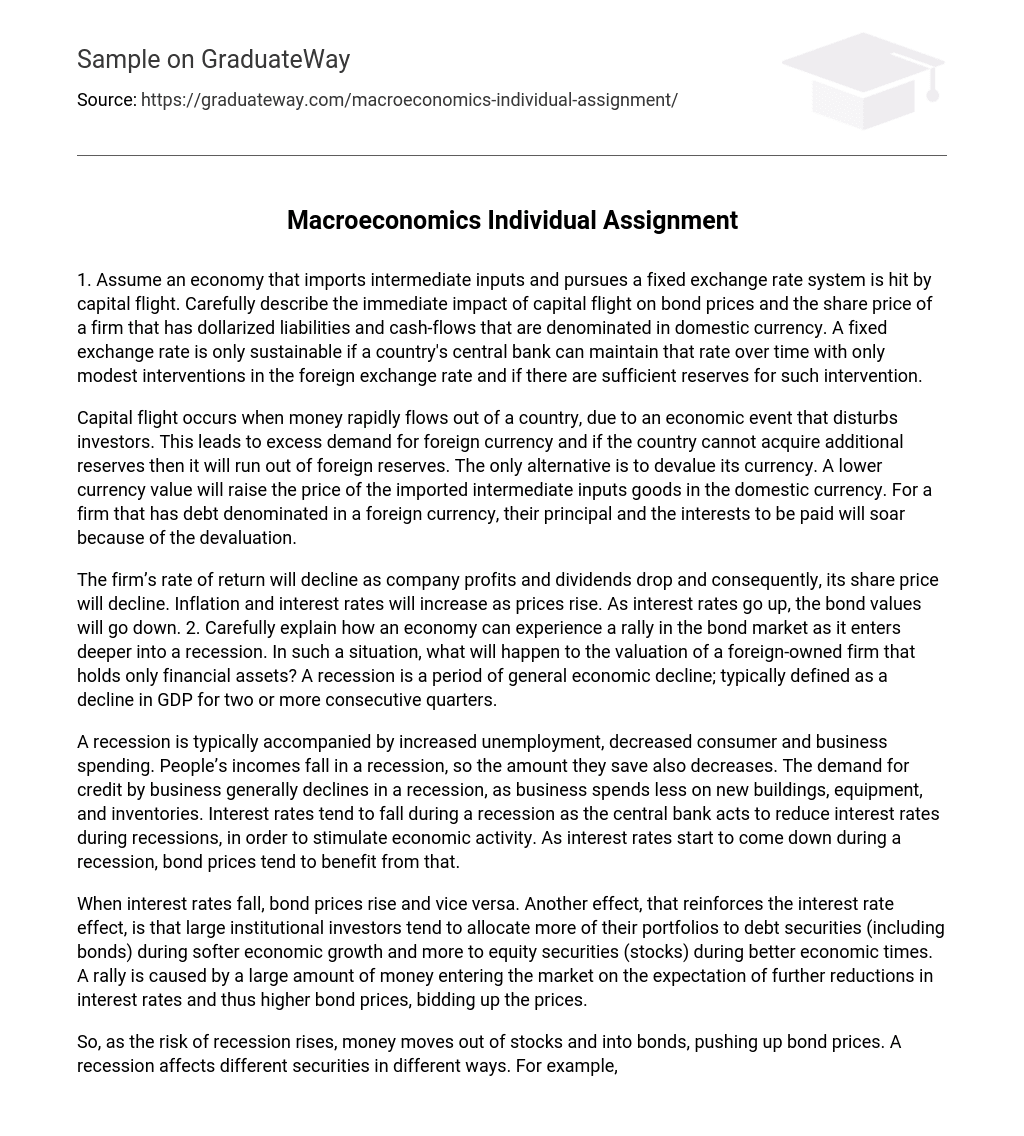1. Assume an economy that imports intermediate inputs and pursues a fixed exchange rate system is hit by capital flight. Carefully describe the immediate impact of capital flight on bond prices and the share price of a firm that has dollarized liabilities and cash-flows that are denominated in domestic currency. A fixed exchange rate is only sustainable if a country’s central bank can maintain that rate over time with only modest interventions in the foreign exchange rate and if there are sufficient reserves for such intervention.
Capital flight occurs when money rapidly flows out of a country, due to an economic event that disturbs investors. This leads to excess demand for foreign currency and if the country cannot acquire additional reserves then it will run out of foreign reserves. The only alternative is to devalue its currency. A lower currency value will raise the price of the imported intermediate inputs goods in the domestic currency. For a firm that has debt denominated in a foreign currency, their principal and the interests to be paid will soar because of the devaluation.
The firm’s rate of return will decline as company profits and dividends drop and consequently, its share price will decline. Inflation and interest rates will increase as prices rise. As interest rates go up, the bond values will go down. 2. Carefully explain how an economy can experience a rally in the bond market as it enters deeper into a recession. In such a situation, what will happen to the valuation of a foreign-owned firm that holds only financial assets? A recession is a period of general economic decline; typically defined as a decline in GDP for two or more consecutive quarters.
A recession is typically accompanied by increased unemployment, decreased consumer and business spending. People’s incomes fall in a recession, so the amount they save also decreases. The demand for credit by business generally declines in a recession, as business spends less on new buildings, equipment, and inventories. Interest rates tend to fall during a recession as the central bank acts to reduce interest rates during recessions, in order to stimulate economic activity. As interest rates start to come down during a recession, bond prices tend to benefit from that.
When interest rates fall, bond prices rise and vice versa. Another effect, that reinforces the interest rate effect, is that large institutional investors tend to allocate more of their portfolios to debt securities (including bonds) during softer economic growth and more to equity securities (stocks) during better economic times. A rally is caused by a large amount of money entering the market on the expectation of further reductions in interest rates and thus higher bond prices, bidding up the prices.
So, as the risk of recession rises, money moves out of stocks and into bonds, pushing up bond prices. A recession affects different securities in different ways. For example, holders of bonds stand to benefit because inflation and interest rates may decline. Conversely, stockholders of manufacturing firms will probably see company profits and dividends drop. Therefore, the net effect on the valuation of a company holding financial assets is dependent on the proportion of bonds to socks in its portfolio.
The value of a foreign-owned firm with bonds will therefore tend to increase. Section II 1. Using the model described in class, plot the impact of a 1% shock to money supply growth on unemployment, inflation and economic growth, assuming that the current shock is always 90% of the past shock. Describe in words the short run impact of such a shock on unemployment, inflation and output growth. Unemployment will rise, as inflation and output growth will tend to decline. 2. Suppose that the unemployment rate is 5 percentage points below its NAIRU.
Trace out the adjustment of the economy over time, assuming that there is no shock. Non-accelerating inflation rate of unemployment (NAIRU) is the lowest unemployment rate that an economy can accommodate without causing inflation. If the unemployment rate is 5% below NAIRU, the adjustment in the economy would be as illustrated below: 3. From your answer in 2, deduce what would happen to bond prices and the exchange rate in the short run. Bond prices and the exchange rate would remain stagnant.





